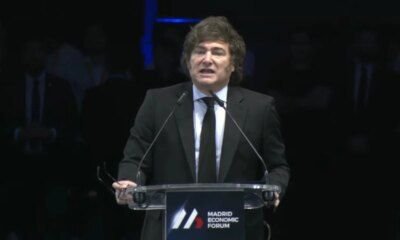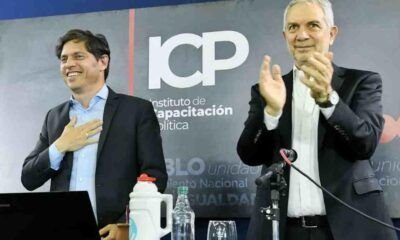INTERNACIONAL
Hegseth says he’s undoing ‘social justice/Biden initiative’ that Trump signed into law

Defense Secretary Pete Hegseth announced that he had «proudly ended» the Women, Peace and Security program at the Pentagon on Tuesday, a program signed into law by President Donald Trump in his first term.
«WPS is yet another woke divisive/social justice/Biden initiative that overburdens our commanders and troops – distracting from our core task: WAR-FIGHTING,» Hegseth wrote in a post on X.
«WPS is a UNITED NATIONS program pushed by feminists and left-wing activists. Politicians fawn over it; troops HATE it.»
Hegseth said the department would comply with the minimum requirements of the program dictated by law and lobby to fully end it in the next budget. «GOOD RIDDANCE WPS!» he added.
HEGSETH VOWS CRACKDOWN ON MILITARY OBESITY AFTER SHOCKING RESERVE, GUARD REPORT
The Women, Peace and Security program was implemented across departments in 2019. (U.S. Army photo by Cpl. Clay Beyersdorfer)
But the message raised eyebrows as much of the rest of Trump’s administration has supported the WPS programs.
Trump signed the WPS Act into law in 2017 and released a WPS strategy in 2019.
Homeland Security Secretary Kristi Noem penned the 2017 Women, Peace and Security Act as a House member from South Dakota alongside Rep. Jan Schakowsky (D-Ill.). Secretary of State Marco Rubio co-sponsored the legislation when he was in the Senate, and national security advisor Mike Waltz was a founding member of the WPS congressional caucus when he was in the House.
«The WPS Strategy recognizes the diverse roles women play as agents of change in preventing and resolving conflict, countering terrorism and violent extremism, and building post conflict peace and stability,» the strategy read.
Hegseth later clarified that he meant the Biden administration had «ruined» WPS.
«The woke & weak Biden Administration distorted & weaponized the straight-forward & security-focused WPS initiative launched in 2017. So—yes—we are ending the «woke divisive/social justice/Biden (WPS) initiative,» he added in a follow-up post on X. «Biden ruined EVERYTHING, including ‘Women, Peace & Security.’»
The White House could not be reached for comment on whether it still supported the program.
EX-PENTAGON AIDE URGES TRUMP TO FIRE HEGSETH, CITING ‘FULL-BLOWN MELTDOWN’ AND ‘TOTAL CHAOS’

Hegseth said he would work to undo the WPS program. (FRANCO BRANA/AFP via Getty Images)
«The WPS Strategy seeks to increase women’s meaningful leadership in political and civic life by helping to ensure they are empowered to lead and contribute, equipped with the necessary skills and support to succeed, and supported to participate through access to opportunities and resources,» the Trump-era strategy read.
It guided WPS plans at the Defense, State and Homeland Security departments as well as USAID.
«Around the world, conflict and disasters adversely and disproportionately affect women and girls, yet women remain under-represented in efforts to prevent and resolve conflict, and in post-conflict peacebuilding or recovery efforts. Research has shown that peace negotiations are more likely to succeed, and result in lasting stability, when women participate,» the document went on.
Trump promoted the program on his «Women for Trump» accomplishments page of his campaign website.
The Women, Peace and Security Act originated with United Nations Security Council Resolution 1325 in 2000, and the U.S. became the first country to adopt a whole-of-government approach to undertaking the WPS agenda in 2019.

Trump signed the WPS Act into law in 2017. (Donald Trump 2024 campaign)
CLICK HERE TO GET THE FOX NEWS APP
Rubio touted the legislation as recently as this month.
«President Trump also signed the Women, Peace, and Security Act, a bill that I was very proud to have been a co-sponsor of when I was in the Senate, and it was the first comprehensive law passed in any country in the world – the first law passed by any country anywhere in the world — focused on protecting women and promoting their participation in society,» he said at a Women of Courage awards ceremony on April 1.
Pete Hegseth,Pentagon News & Events,Conflicts Defense,U.S. Defense & Military Politics,Politics
INTERNACIONAL
Canciller uruguayo sobre Venezuela: “Tenemos un uruguayo fallecido y no lo podemos sacar; no resiste más”
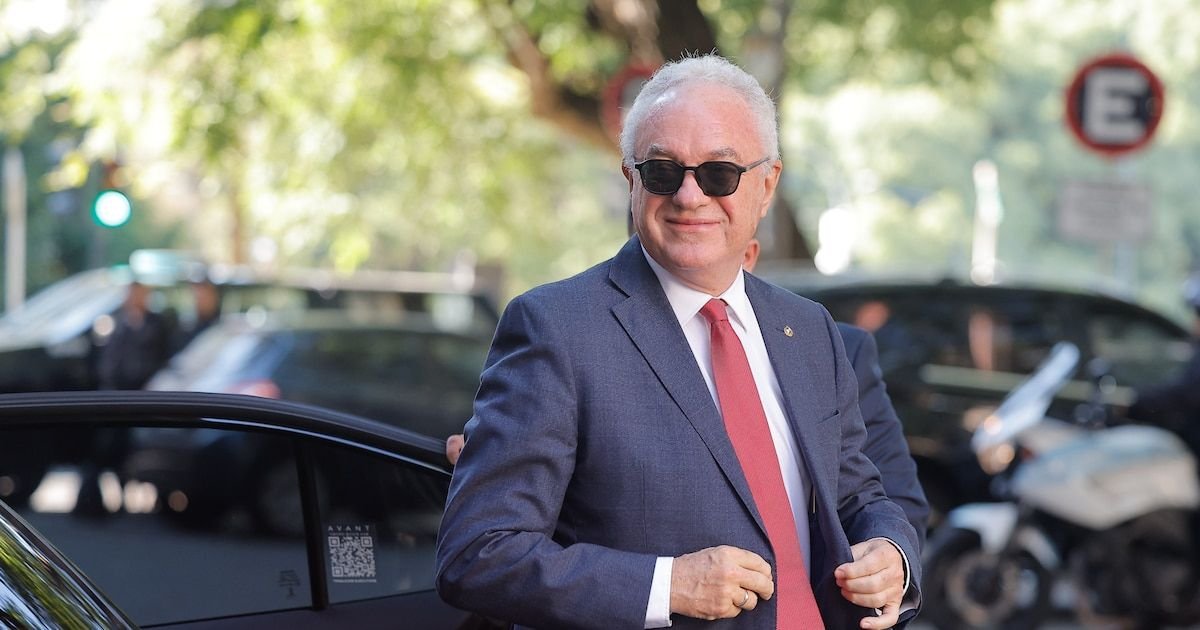
El canciller de Uruguay, Mario Lubetkin, habló la semana pasada con la pareja de Fabián Buglione, el uruguayo-estadounidense que está detenido en Venezuela por el régimen de Nicolás Maduro. El país se puso “a disposición” de la familia, pero las dificultades en el vínculo diplomático entre los estados genera dificultades.
Uruguay no tiene “demasiada información” sobre el uruguayo que llegó el 19 de octubre a Venezuela a visitar a su novia cuando fue detenido, según aseguró Lubetkin en entrevista con El Observador. Los datos oficiales son que Buglione está en la cárcel de El Rodeo 1, en el estado de Miranda, adonde el régimen de Maduro ha enviado a varios presos políticos.
“Sabemos que la señora de Buglione está en contacto tanto con nosotros como con el Departamento de Estado de Estados Unidos. Nos pusimos a su disposición para ver qué posibilidades teníamos de respaldarla a ella. Finalmente es un uruguayo detenido en otro país”, señaló el ministro de Relaciones Exteriores del gobierno de Yamandú Orsi.

Sin embargo, las posibilidades de avanzar son pocas por el prácticamente nulo vínculo diplomático que existe entre los países.
“Tenemos la dificultad de no tener un mecanismo consular con Venezuela. Hace dos semanas tenemos un uruguayo fallecido en Caracas y no lo podemos sacar. Eso no resiste más de nuestro lado ni de los venezolanos. Cuántos casos más habrá de situaciones de miles de venezolanos que hay acá”, dijo el canciller en la entrevista que se publicó este sábado.
Lubetkin dijo que el vínculo entre los dos países tiene un “estatus extraño” porque, si bien las relaciones diplomáticas no se rompieron, las embajadas están cerradas.
“Estamos buscando un camino que nos permita afrontar los temas consulares entendiendo que nosotros no vamos a cambiar nuestra posición de no reconocimiento de los resultados de las últimas elecciones”, señaló el ministro.
El gobierno de Orsi ha tomado algunas definiciones diferentes en comparación al de Luis Lacalle Pou. El presidente anterior resolvió enviar un embajador a Venezuela con el argumento de que el vínculo es con el Estado más allá de los gobiernos. El gobierno actual, sin embargo, prefiere no mandar un representante a ese país.

“No, embajador no”, respondió Lubetkin ante la consulta de si se analiza designar a alguien allí. “Estamos buscando un mecanismo consular que no signifique cambiar la posición del no reconocimiento de los resultados de las últimas elecciones presidenciales. Desde el punto de vista de la práctica diplomática, existen mecanismos para afrontar los temas ciudadanos sin tener necesariamente un embajador. Embajador es reconocimiento”, amplió el canciller.
Lubetkin agregó que Uruguay tiene diálogo tanto con las actuales autoridades de Venezuela como con la oposición. Y, sobre el caso de Buglione, expresó: “En nuestras posibilidades estamos para ejercer todos los mecanismos de acción diplomática que podamos. Pero hay que entender que muchas veces hay que hacerlo sin decirlo”.

El presidente Yamandú Orsi también expresó, entrevistado en El Observador, su preocupación por el uruguayo detenido por el régimen de Maduro en Venezuela. “Hoy tenemos una realidad compleja que a mí me preocupa mucho. Leyeron de un uruguayo que está preso allá. Nosotros hace tiempo que tenemos conversaciones con gente de Estados Unidos y Venezuela por ese caso. A mí lo que no me gusta es que no tengamos consulados, porque es la única forma que tienen los venezolanos acá y los uruguayos allá de tener una línea. Yo creo que deberíamos revisar eso”, apuntó, en línea con lo que había señalado el canciller.
Otro de los cambios del gobierno actual respecto a la postura que tomó Lacalle Pou es sobre el reconocimiento a Edmundo González Urrutia como presidente de Venezuela. El canciller uruguayo explicó tiempo atrás que el gobierno no reconoce ni a Maduro “ni al presidente que señaló haber triunfado según las actas que mostró por internet”.
corresponsal: Desde Montevideo
INTERNACIONAL
Lula busca consejo de China para regular las redes sociales tras el fracaso legislativo
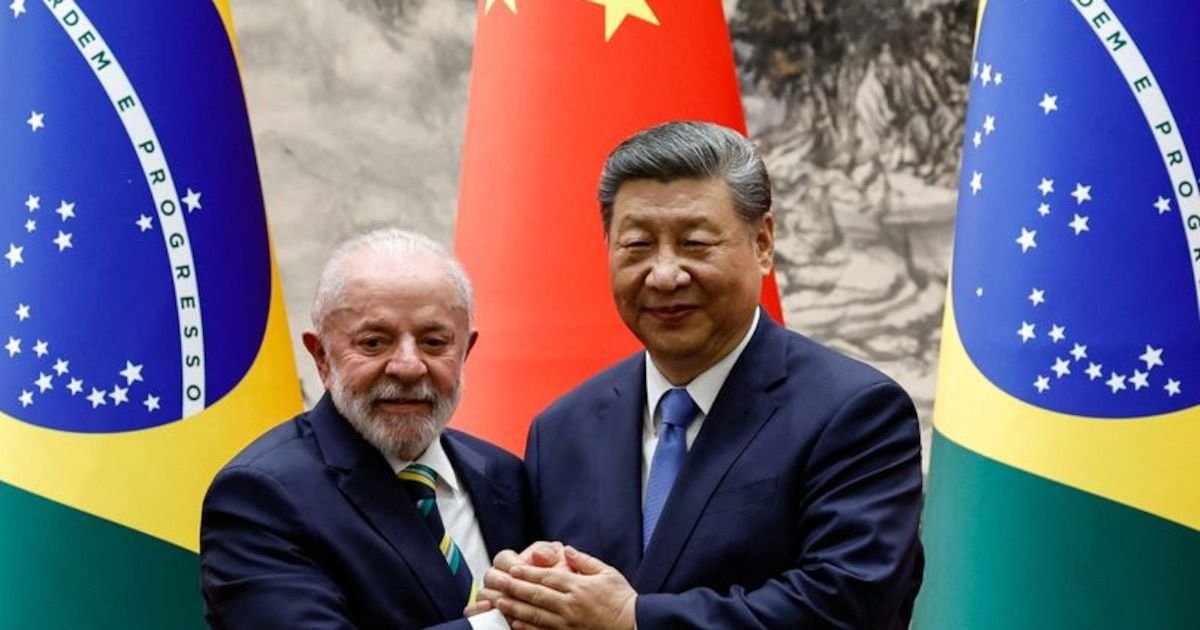
El debate sobre la regulación de las redes sociales en Brasil se vuelve cada vez más polémico. La semana pasada se reanudó en el Supremo Tribunal Federal (STF) el juicio sobre la constitucionalidad del artículo 19 del Marco Brasileño de Derechos Civiles en Internet, una ley de 2014. El artículo se refiere a la responsabilidad de las plataformas digitales por los contenidos ilegales publicados por los usuarios, como la incitación al odio, la desinformación, la incitación a la violencia y los delitos contra niños y adolescentes. En diciembre, al inicio del juicio, tres jueces del STF, Dias Toffoli, Luiz Fux y Luís Roberto Barroso, actual presidente de la Corte Suprema, se pronunciaron a favor de endurecer las obligaciones de las plataformas. El cuarto juez que votó la semana pasada, André Mendonça, expresó su desacuerdo y votó a favor de mantener, en general, el modelo actual, considerando que el artículo 19 es conforme a la Constitución. La próxima audiencia del proceso está prevista para el miércoles 11.
Hay mucha expectación por el resultado final, ya que el STF, con el objetivo de combatir las “noticias falsas”, la “desinformación” y la “incitación al odio”, podría revocar la legislación vigente, considerar a las plataformas responsables de los contenidos que publican y obligarlas a retirar los contenidos de la red incluso sin recibir una orden judicial.
“Esto supondrá la externalización de la censura en Brasil, incluida la censura preventiva, ya vigente en el país con la eliminación de los perfiles de los opositores al actual Gobierno de las redes sociales a petición del STF. Para evitar problemas, las plataformas se anticiparán a las solicitudes de eliminación presentadas por terceros”, escribe el periodista Mario Sabino en el sitio web de noticias Metrópoles. “En la redacción del artículo 19 —explica un editorial del sitio web de noticias Gazeta do Povo— el legislador tuvo la clara intención de proteger la libertad de expresión, incluidos, y en particular, los discursos incómodos, contradictorios y críticos”. “Solicitar una decisión judicial antes de eliminar un contenido representa una protección contra la tentación, tan común hoy en día, de etiquetar como ofensivo o desinformativo lo que simplemente desafía el pensamiento o molesta”, concluye el texto.
La mayoría de los ciudadanos brasileños se ha mostrado a favor de la responsabilización de las redes sociales. Una encuesta realizada en enero por Nexus Pesquisa e Inteligência de Dados mostró que el 78% de los encuestados está a favor de la responsabilización, mientras que solo el 14% no está de acuerdo. Además, a finales de abril, decenas de personalidades, intelectuales y ex ministros lanzaron un manifiesto público titulado “Internet sin regulación mata”, pidiendo la regulación de las redes sociales. Entre los firmantes se encontraban el fotógrafo Sebastião Salgado antes de su muerte y la estrella brasileña de la música Daniela Mercury. “Exigimos que las plataformas digitales y las redes sociales sean reguladas en su funcionamiento, como ocurre y debe ocurrir con todas las actividades en una sociedad democrática”, reza el documento.
En cuanto a las Big Tech, piden mayores garantías para evitar la inseguridad jurídica en el entorno digital en Brasil. A la cadena de televisión CNN Brasil, Google envió un texto en el que dice que “la abolición de las normas que separan la responsabilidad civil de las plataformas de la de los usuarios no contribuirá a poner fin a la circulación de contenidos indeseados en Internet”. “El marco normativo sobre los derechos civiles en Internet puede y debe mejorarse, siempre que se establezcan criterios y garantías procesales para evitar la incertidumbre jurídica y la eliminación indiscriminada de contenidos”, se lee en el documento. Google ha declarado que identifica y elimina cada año “cientos de millones de contenidos” que violan las normas de sus plataformas, pero que no puede gestionar lo que denomina “contenidos controvertidos”. “La acción judicial en estos casos es uno de los puntos más importantes del Marco Brasileño de Derechos Civiles en Internet, que reconoce el poder del poder judicial para actuar en estas situaciones y trazar una línea divisoria entre el discurso ilícito y la crítica legítima”, concluye el texto.

Además, tras el fracaso del proyecto de ley sobre la regulación de las redes sociales, el llamado proyecto de ley sobre las noticias falsas (PL 2630/2020), aprobado por el Senado pero bloqueado en la Cámara desde 2023, el Gobierno de Lula está preparando otro proyecto de ley que prevé, entre otras cosas, la designación de una autoridad para bloquear las redes sociales que no denuncien los delitos cometidos en el entorno virtual, sin necesidad de una orden judicial. El proyecto de ley está siendo elaborado por el Ministerio de Justicia. “Tenemos media docena de empresas de redes sociales que gobiernan el mundo. Tenemos que trabajar en la regulación de las redes digitales. El Parlamento debe tener el valor. Si el Parlamento no tiene el valor, el Supremo Tribunal Federal debe tenerlo para crear una regulación”, declaró Lula.
Sin embargo, el tema ha suscitado críticas entre los expertos, que consideran que debe ser el poder legislativo y no el judicial o el ejecutivo el que lleve a cabo una reforma regulatoria. Según Luiz Fernando Plastino Andrade, doctor en Derecho Civil por la Universidad de San Pablo (USP), el Parlamento tiene la oportunidad de crear normas que eliminen la incertidumbre derivada de decisiones judiciales contradictorias. “El Congreso tiene la oportunidad de introducir una normativa general que haya sido ampliamente debatida. Esto eliminará la incertidumbre derivada de la posibilidad de que se adopten decisiones específicas que, en ocasiones, van en contra de las expectativas del mercado y de los ciudadanos”, afirmó el experto al diario O Estado de São Paulo.
Sin duda, lo ocurrido en China durante la última visita oficial de Lula el pasado mes de mayo no ha apaciguado el debate. Durante una reunión privada con su homólogo chino Xi Jinping, su esposa Rosangela da Silva, conocida como Janja, habría expresado su preocupación por la influencia de TikTok en la política y la opinión pública brasileña, afirmando que el algoritmo de la plataforma favorece a la derecha. Xi le habría respondido que Brasil tiene la legitimidad para regular e incluso prohibir la plataforma si así lo desea.
Lula, interrogado por los periodistas, confirmó que el tema se había discutido directamente con Xi Jinping y añadió que había pedido consejo a China sobre cómo abordar el problema, llegando incluso a proponer el envío de un delegado chino a Brasil para intercambiar experiencias en materia de regulación digital. “Lula confirmó que una persona de confianza del presidente chino vendrá a Brasil para discutir la regulación de las plataformas digitales y que el experto chino será recibido por el jefe de la Secretaría de Comunicaciones Sociales del Gobierno federal”, escribe William Waack en la página web de CNN Brasil. “En otras palabras, el presidente de una democracia pide ayuda a un régimen dictatorial para regular las redes sociales y envía a este colaborador a hablar con su jefe de propaganda. Y recomienda actuar rápidamente al STF, que a su vez, hasta la fecha, no ha definido exactamente qué son las noticias falsas, pero lleva seis años realizando una investigación interminable bajo este nombre, con un enorme impacto y control sobre la política”, escribe Waack, refiriéndose a un juicio del que es responsable el juez Alexandre de Moraes, el mismo que dirige el proceso contra Bolsonaro por su presunto intento de golpe de Estado. Se trata de un caso que se arrastra desde marzo de 2019 y que tiene que ver con un supuesto grupo de WhatsApp llamado ‘Empresarios y Políticos’ en el que algunos partidarios de Bolsonaro compartían mensajes de desinformación política. Uno de los miembros había llegado a escribir que prefería un golpe de Estado a la victoria de Lula.
Ayer, además, André Shalders, del diario O Estado de São Paulo, reveló que Rede Minerva Network, una red “anti-fake news”, financiada con 54,1 millones de reales (9,73 millones de dólares) por el Ministerio de Salud y Justicia y “articulada” por la Secretaría de Comunicación Social del Gobierno de Lula (Secom), pagó el viaje a Cuba de uno de sus investigadores, Marco André Feldman Schneider, que también es coordinador de la Red Nacional para la Lucha contra la Desinformación. El motivo del viaje fue la participación en el IV Coloquio Internacional Patria, un evento del régimen cubano organizado por la Unión de Periodistas de Cuba. El tema del foro era “el vigésimo aniversario de la fundación de Telesur por parte de los líderes Fidel Castro y Hugo Chávez”. Según el sitio web francés sobre libertad de prensa Reporteros Sin Fronteras (RSF), “Cuba sigue siendo, año tras año, el peor país para la libertad de prensa en América Latina » y, en su “Índice de Libertad de Prensa” de 2025, ocupa el puesto 165 de 180 países.
Según el diario O Estado de São Paulo, en su discurso en la conferencia cubana, el investigador brasileño afirmó que “en teoría, hay dos formas de neutralizar la polarización y la incitación al odio en las redes sociales: la regulación económica y la moderación de contenidos en las plataformas digitales, con el objetivo de construir la soberanía digital y popular; y políticas públicas a gran escala para la alfabetización mediática y la información crítica”. Tras el evento, Schneider impartió una conferencia sobre desinformación en la Universidad de La Habana y participó en reuniones sobre un posible acuerdo de cooperación entre el Instituto Brasileño de Información en Ciencia y Tecnología (Ibict), que gestiona el proyecto de la Rede Minerva, y la universidad cubana», escribe Shalders en O Estado de São Paulo, a lo que el investigador respondió diciendo que su viaje a Cuba fue “estrictamente académico”.
Mientras se debate sobre el futuro de la regulación de las redes sociales en Brasil, en estos mismos días dos noticias han puesto de relieve en el debate el temor a la censura. La primera fue la condena de una periodista del diario Zero Hora a pagar 600.000 reales (107.914 dólares) en concepto de indemnización por daños morales a una jueza del Tribunal de Justicia de Rio Grande do Sul. En su artículo, la periodista había escrito que la jueza había recibido en abril un salario de 662.000 reales (119.065 dólares). Fue condenada porque técnicamente no se trataba de un salario, sino de la “suma de subsidios e indemnizaciones compensatorias” y por el “lenguaje sarcástico y dirigido” utilizado en el artículo. Otro caso que ha suscitado polémica es la condena a ocho años de cárcel del cómico Léo Lins, además del pago de una multa de 1,4 millones de reales (251.799 dólares) y 300.000 reales (53.957 dólares) en concepto de indemnización por daños morales colectivos. Según el juez, la culpa es de sus chistes sobre las minorías porque “el humor no puede ser una excusa para cometer delitos”, afirmó. “Aunque los chistes de Leo Lins puedan ser detestables, la condena a ocho años de prisión que ha recibido es típica de las dictaduras”, escribe el diario Folha de São Paulo en un editorial. El diario estadounidense The Washington Post también se ha hecho eco del caso. “La sentencia contra el cómico Léo Lins por chistes contados en 2022 se perfila como el próximo frente en la creciente lucha de Brasil contra la libertad de expresión”, se lee en el artículo.
Asia / Pacific,Diplomacy / Foreign Policy,BEIJING
INTERNACIONAL
Trump’s 21st week back in office set to include China trade talks, LA riot control, sweeping travel ban
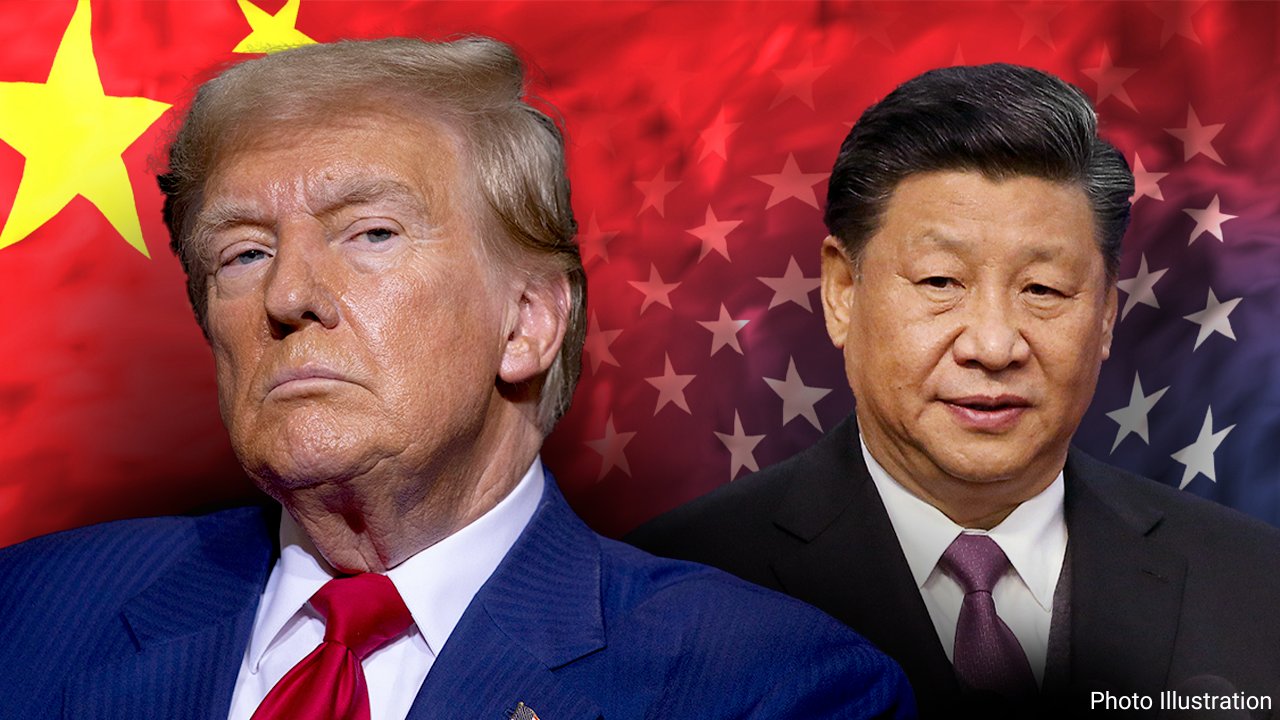
NEWYou can now listen to Fox News articles!
President Donald Trump and his administration are expected to have a whirlwind 21st week back in the White House, including holding high-stakes trade talks with China in London on Monday and continuing efforts to quell wild riots in California targeting federal immigration officials.
Commerce Secretary Howard Lutnick, left, President Donald Trump, Treasury Secretary Scott Bessent (Getty Images)
China trade talks
Trump announced on Truth Social on Friday that Treasury Secretary Scott Bessent, Secretary of Commerce Howard Lutnick and U.S. Trade Ambassador Jamieson Greer will head to London on Monday to continue trade talks with China after both nations installed tit-for-tat duty taxes on one another.
DONALD TRUMP DETAILS ‘MOST EXCITING PART’ OF CHINA TRADE AGREEMENT
«I am pleased to announce that Secretary of the Treasury Scott Bessent, Secretary of Commerce Howard Lutnick, and United States Trade Representative, Ambassador Jamieson Greer, will be meeting in London on Monday, June 9, 2025, with Representatives of China, with reference to the Trade Deal. The meeting should go very well. Thank you for your attention to this matter!» Trump posted.
The planned meeting comes after Trump spoke with Chinese President Xi Jinping on Thursday to discuss trade negotiations between Washington and Beijing.
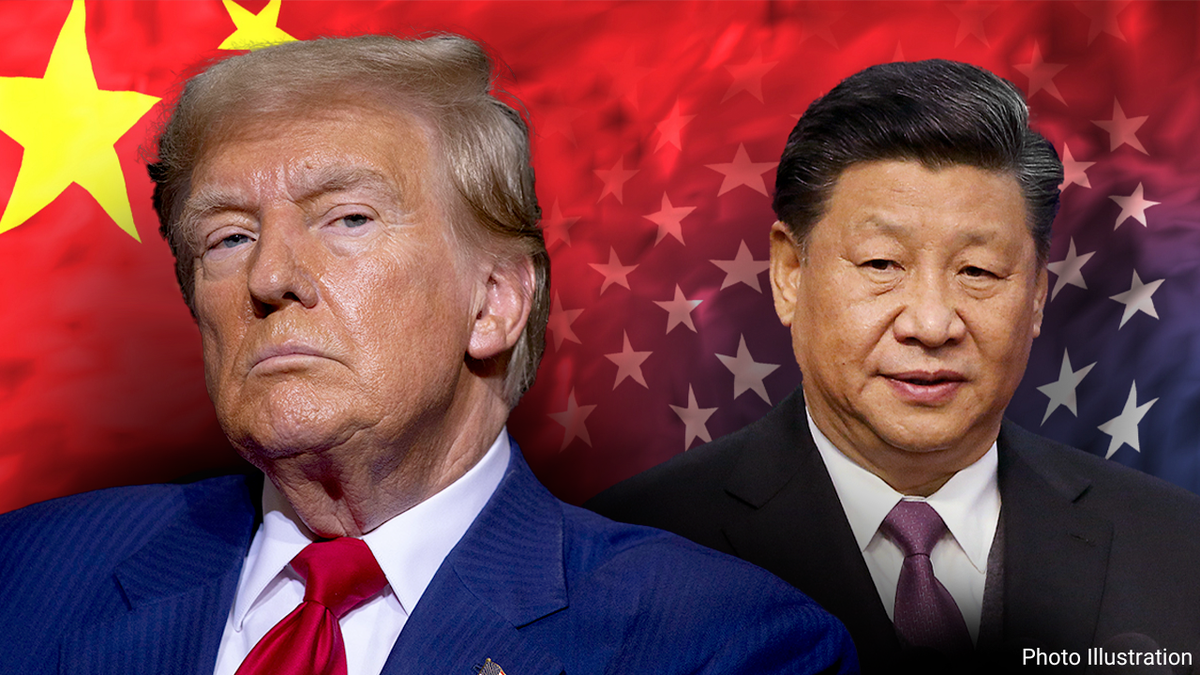
Will the tariff truce with China give President Donald Trump a political bounce? (Fox News)
«I just concluded a very good phone call with President Xi, of China, discussing some of the intricacies of our recently made, and agreed to, Trade Deal,» Trump said Thursday in a Truth Social post. «The call lasted approximately one and a half hours, and resulted in a very positive conclusion for both Countries.»
TRUMP ANNOUNCES CHINA WILL RESTART RARE EARTH MINERAL SHIPMENTS TO US AFTER PRODUCTIVE CALL
Trump said the conversation focused «almost entirely» on trade and that Xi invited the U.S. president and first lady Melania Trump to visit China. Likewise, Trump reciprocated and invited Xi and his wife, Peng Liyuan, to visit the U.S.
The Trump administration leveled tariffs as high as 145% on Chinese goods following the president’s reciprocal tariff plans in April, when China retaliated against the U.S. with tariffs of its own. China and the U.S. reached a preliminary trade agreement last month, which Trump said China violated in a Truth Social post at the end of May.
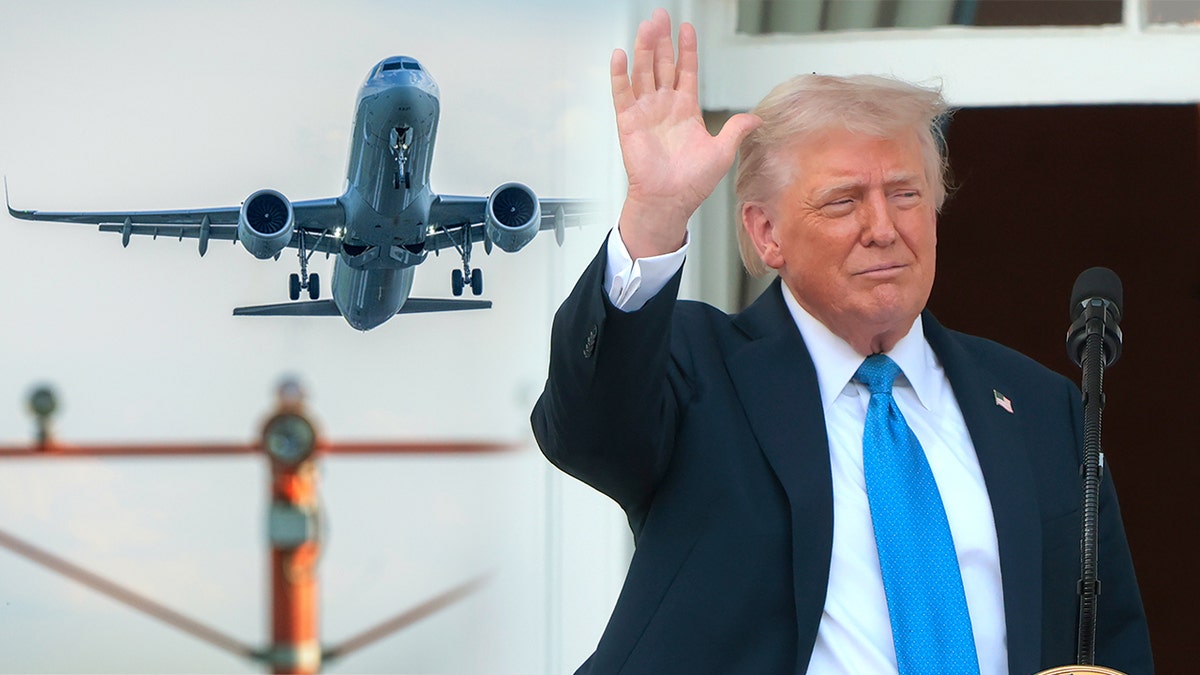
President Donald Trump invited the Chinese president to visit the U.S. after receiving an invitation to visit China. (J. David Ake/Getty Images)
Travel ban takes effect
Trump signed a proclamation on Wednesday banning people from 12 foreign nations from traveling to the U.S., and imposing travel restrictions on seven other nations, as part of a crackdown on «dangerous foreign actors that want to come to our country and cause us harm,» according to the White House.
The travel ban takes effect on Monday.
The ban will completely bar travelers from Afghanistan, Myanmar, Chad, Republic of the Congo, Equatorial Guinea, Eritrea, Haiti, Iran, Libya, Somalia, Sudan and Yemen.
CRITICS HAVE MELTDOWN AND ACCUSE TRUMP OF IMPOSING RENEWED ‘MUSLIM BAN’ THROUGH ‘DISGUSTING’ TRAVEL ORDER
Seven other countries face partial travel restrictions, including Burundi, Cuba, Laos, Sierra Leone, Togo, Turkmenistan and Venezuela.
«The recent terror attack in Boulder, Colorado, has underscored the extreme dangers posed to our country by the entry of foreign nationals who are not properly vetted, as well as those who come here as temporary visitors and overstay their visas,» Trump said in a video posted Wednesday on social media. «We don’t want them.»
«In the 21st century, we’ve seen one terror attack after another carried out by foreign visa overstayers from dangerous places all over the world,» he added. «Thanks to Biden’s open-door policies, today there are millions and millions of these illegals who should not be in our country.»
TRUMP TRAVEL BAN 2.0 IS BUILT TO SURVIVE COURT CHALLENGES, EXPERTS SAY
Officials charged Mohamed Sabry Soliman last Monday with a hate crime, attempted first-degree murder, crimes against at-risk adults/elderly and other charges after he allegedly threw Molotov cocktails at a pro-Israel group, Run for Their Lives, in a Boulder park last Sunday. The Egyptian national was living in the U.S. illegally after entering on a work visa two years ago that has since expired, according to federal officials.
Trump’s travel restriction announcement sparked widespread backlash among Democrat lawmakers and critics on social media, who slammed Trump for allegedly promoting Islamophobia.
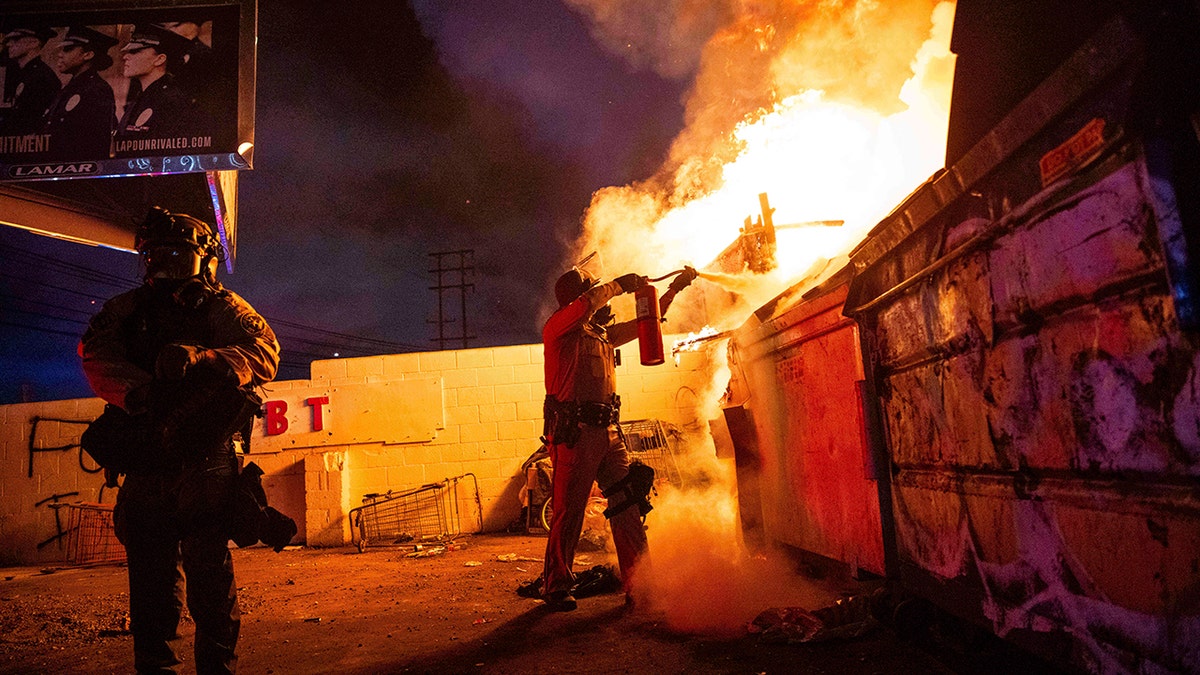
A law enforcement officer works to put out a fire during a protest in Compton, Calif., on June 7, 2025, after federal immigration authorities conducted operations. (AP Photo/Ethan Swope)
All eyes on California riots
Riots broke out in Los Angeles over the weekend as federal immigration officials converged on the left-wing city to carry out immigration raids as part of Trump’s campaign promise to deport millions of illegal immigrants who flooded into the nation under the Biden administration.
Violent protesters took to the streets and were seen throwing rocks and other materials at federal law enforcement officials, as well as setting cars on fire and looting local stores, in protest of the raids.
NEWSOM’S OFFICE COMPARES LA RIOTS AGAINST FEDERAL AGENTS TO SPORTS CELEBRATIONS
Trump sent 2,000 National Guard soldiers to L.A. early Sunday to help restore order as immigration protests turned into riots, queuing up a week that will likely include fireworks from Democrat California Gov. Gavin Newsom, who has repeatedly defended illegal immigrants amid the raids.
«Great job by the National Guard in Los Angeles after two days of violence, clashes and unrest,» Trump posted to Truth Social early Sunday morning. «We have an incompetent Governor (Newscum) and Mayor (Bass) who were, as usual (just look at how they handled the fires, and now their VERY SLOW PERMITTING disaster. Federal permitting is complete!), unable to to handle the task. These Radical Left protests, by instigators and often paid troublemakers, will NOT BE TOLERATED. Also, from now on, MASKS WILL NOT BE ALLOWED to be worn at protests. What do these people have to hide, and why??? Again, thank you to the National Guard for a job well done!»
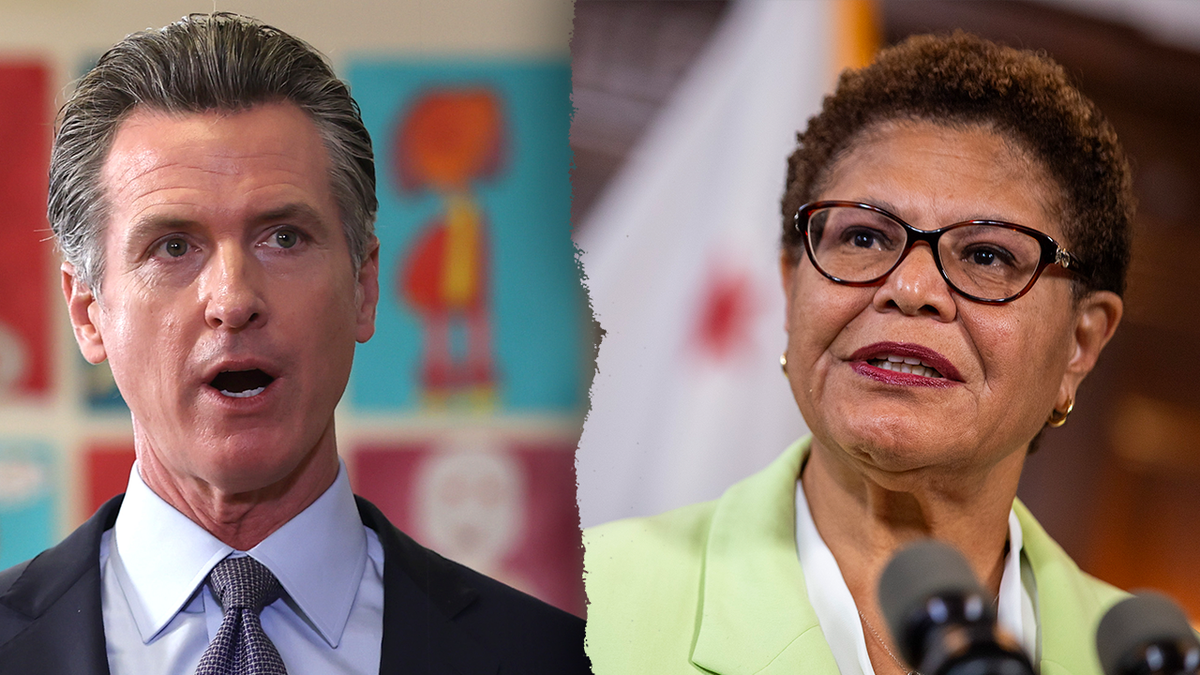
California Gov. Gavin Newsom and L.A. Mayor Karen Bass (Getty Images)
Newsom on Friday described the Trump administration’s immigration raids in Los Angeles as «chaotic and reckless.»
«Continued chaotic federal sweeps, across California, to meet an arbitrary arrest quota are as reckless as they are cruel. Donald Trump’s chaos is eroding trust, tearing families apart, and undermining the workers and industries that power America’s economy,» Newsom’s statement read.
The press office doubled down in support of shielding illegal immigrants from deportation in a response X post to White House press secretary Karoline Leavitt on Saturday.
«In recent days, violent mobs have attacked ICE Officers and Federal Law Enforcement Agents carrying out basic deportation operations in Los Angeles, California,» Leavitt posted to X. «These operations are essential to halting and reversing the invasion of illegal criminals into the United States. In the wake of this violence, California’s feckless Democrat leaders have completely abdicated their responsibility to protect their citizens.»
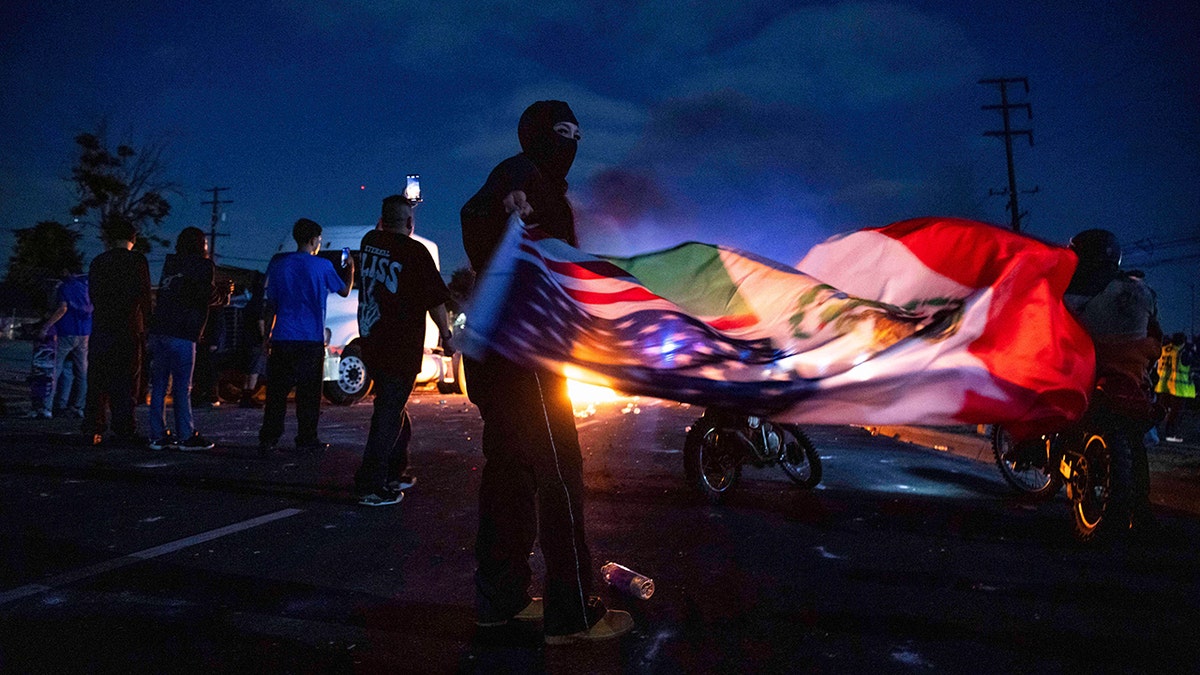
A demonstrator waves a U.S. and Mexican flag during a protest in Compton, Calif., on June 7, 2025. (AP Photo/Ethan Swope)
Newsom’s office responded, «These are anything but basic. Your indiscriminate sweeps are terrifying entire communities and detaining hardworking, tax-paying Californians. It’s cruel escalation and must end.»
When asked about the riots and a handful of California Republicans pinning blame for the violence on Newsom and Los Angeles Mayor Karen Bass for supporting illegal immigrants amid the raids, Newsom’s office compared the riots to sports celebrations.
CALIFORNIA REPUBLICANS SLAM NEWSOM, BASS FOR LETTING LA BURN WITH RIOTS AMID TRUMP IMMIGRATION BLITZ
«LA riots? Have these geniuses ever seen what happens when the Eagles win a playoff game?» Izzy Gardon, Newsom’s communications director, told Fox News Digital, referring to how Philadelphia Eagles fans notoriously party after big-game wins.

Elon Musk has been sparring with President Donald Trump after working in his administration. (BRENDAN SMIALOWSKI/AFP via Getty Images)
Elon Musk fallout
Tech billionaire Elon Musk wrapped up his tenure as the leader of the Department of Government Efficiency late last month and then publicly attacked a sweeping piece of legislation promoted by Trump to fund his second administration’s agenda, sparking a fiery fight between the former allies that is expected to carry into this week.
«I’m sorry, but I just can’t stand it anymore,» Musk posted to X on Tuesday. «This massive, outrageous, pork-filled Congressional spending bill is a disgusting abomination. Shame on those who voted for it: you know you did wrong. You know it.»
‘KILL BILL’: ELON MUSK’S CONSERVATIVE EVOLUTION PUTS HIM AT ODDS WITH TRUMP ON KEY LEGISLATION
Fiscal conservatives in Congress have spoken out against the One Big Beautiful Bill Act as one that will increase the U.S. national debt by trillions, including Senate Republicans threatening to withhold support for the legislation after its passage in the House last month. Trump has defended the legislation as a bill that would lower taxes for Americans across the tax brackets while also tightening border security and allowing independent energy resources in the U.S. to prosper.
Musk continued slamming the legislation throughout the week, including urging lawmakers to «kill the bill» on Wednesday.
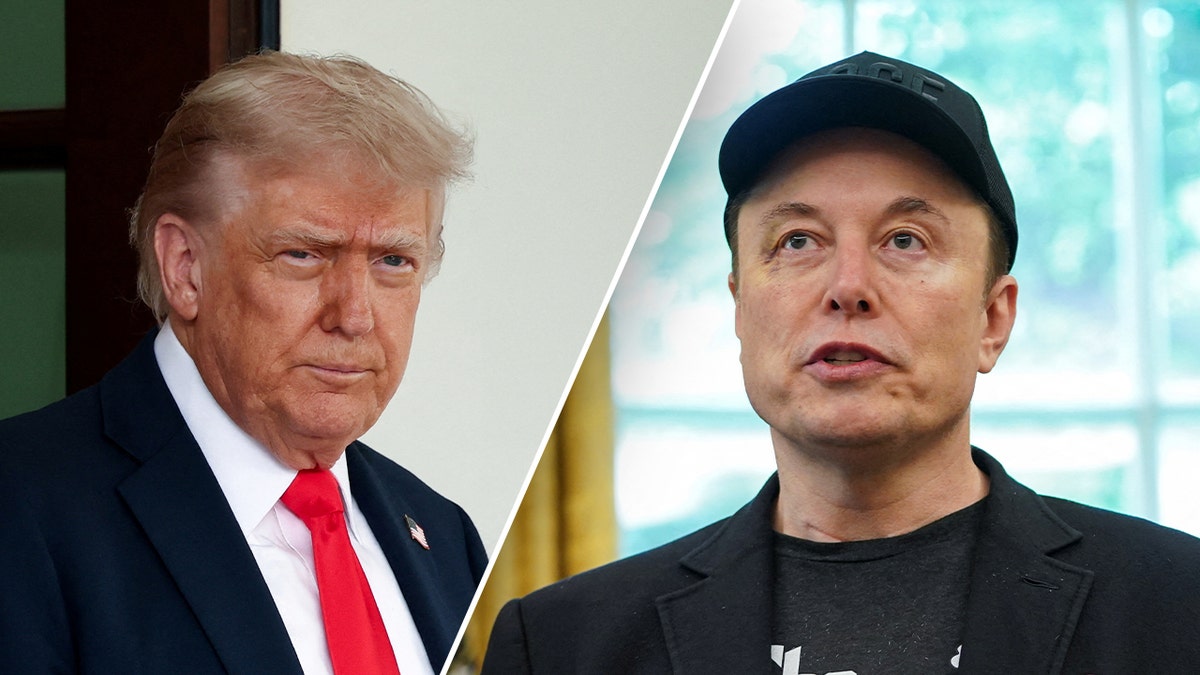
President Donald Trump said he was «disappointed» with Elon Musk after the billionaire criticized the «big, beautiful bill.» (Reuters)
On Thursday, Trump directly addressed Musk’s comments, saying in an Oval Office meeting with the chancellor of Germany that he was «disappointed» by Musk’s attacks on the legislation and said he was unsure how their friendly relationship would fare through the criticisms. Trump added that Musk’s disapproval of the bill was allegedly tied to its cuts to electrical vehicle mandates. Musk is the CEO of electric vehicle company Tesla.
«I’m very disappointed because Elon knew the inner workings of this bill better than almost anybody sitting here, better than you people. He knew everything about it. He had no problem with it,» Trump said Thursday. «All of a sudden, he had a problem. And he only developed the problem when he found out that we’re going to have to cut the EV mandate.»
«Elon and I had a great relationship. I don’t know if we will anymore,» Trump added.
The pair later launched attacks on one another on social media.
«Elon was ‘wearing thin,’ I asked him to leave, I took away his EV Mandate that forced everyone to buy Electric Cars that nobody else wanted (that he knew for months I was going to do!), and he just went CRAZY!» Trump posted to X on Thursday.
ELON MUSK ‘DISAPPOINTED’ BY TRUMP’S SPENDING BILL, SAYS IT UNDERMINES WHAT DOGE IS DOING
«Such an obvious lie. So sad,» Musk responded on X.
Later Thursday, Musk posted a now-deleted message reading: «@RealDonaldTrump is in the Epstein files,» Musk wrote on X. «That is the real reason they have not been made public. Have a nice day, DJT!»
Trump told NBC News on Saturday that he assumes his relationship with Musk is over, while warning that Musk would «pay the consequences» if he launches campaign initiatives backing Democrats ahead of the midterms next year.
CLICK HERE TO GET THE FOX NEWS APP
«I’m too busy doing other things,» Trump told NBC News on Saturday when asked about his relationship with Musk. «You know, I won an election in a landslide. I gave him a lot of breaks long before this happened. I gave him breaks in my first administration and saved his life in my first administration. I have no intention of speaking to him.»
Fox News Digital’s Diana Stancy contributed to this report.
-

 POLITICA2 días ago
POLITICA2 días agoCristina Kirchner advirtió que la pueden “meter presa” y lo relacionó con su candidatura a diputada provincial
-
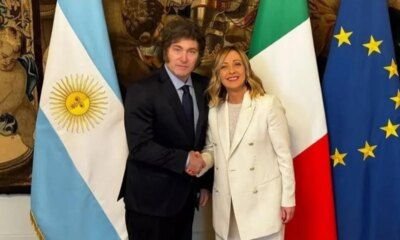
 ECONOMIA3 días ago
ECONOMIA3 días agoUn proyecto de u$s100.000 millones: claves del acuerdo entre Milei y Meloni para exportar gas de Vaca Muerta
-

 POLITICA2 días ago
POLITICA2 días agoTras la muerte de Thiago, Patricia Bullrich redobló su defensa del policía y pidió perpetua para los tres ladrones








